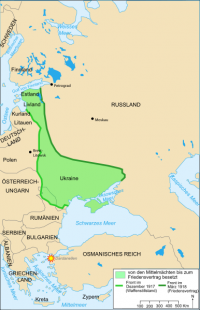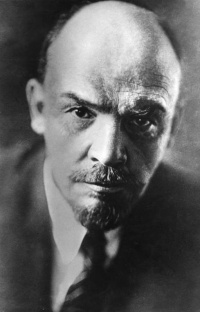Background↑
Policies on Peace↑
On 20 July (2 August) 1914, Nicholas II, Emperor of Russia (1868-1918) vowed before dignitaries in the Winter Palace that he would not make peace while a single foreign soldier remained on Russian soil. Outside, on Palace Square, students, townsfolk and workers gathered, cheering, waving flags and singing “God Save the Tsar”. For Russia’s liberal or left-wing political parties, only recently legalised as a result of the revolutionary upheavals of 1905, the question of how to respond to the Tsar’s mobilisation of the country for war was a vexing one. The liberal Constitutional Democratic Party, or Kadets, resolved to set aside the struggle for political and social reform and joined conservative and rightist parties in pledging unqualified support to the monarchy and its government until victory was secured. From 1915 on, though, military reversals, economic disarray, administrative mismanagement, and growing popular discontent prompted liberals in Russia’s parliament, the Duma, to call for a new government enjoying public confidence and capable of conducting a successful war effort. On the left, the Socialist Revolutionaries and the Menshevik and Bolshevik Social Democratic Parties were bitterly divided internally by the war issue. In each party there emerged “defencist” factions, which argued that defence of the nation must come before revolutionary struggle, and “internationalist” factions agitating for a worldwide socialist movement for peace without victors or vanquished. The exiled Bolshevik leader Vladimir Lenin (1870-1924), however, subscribed to a more radical internationalism and proclaimed in his “Theses on the War” of late August 1914 that the war between empires should be turned into a civil war between classes across Europe, even arguing that Russian defeat was desirable if it damaged the ruling dynasty.
Lenin’s Victory↑
In February 1917, the tsarist regime was brought down by protests from women in Petrograd bread queues, striking workers, and rebellious garrison soldiers demanding an end to the war as well as to Romanov rule. The vacuum of power was filled by a Provisional Government, composed largely of Duma liberals and provisionally supported by the Menshevik-dominated Executive Committee of the socialist council, the Petrograd Soviet, which had sprung up to coordinate the activities of workers and soldiers. The negotiations between the Duma deputies and Soviet Executive Committee which produced this arrangement of “dual power” evaded the crucial issue of the war. When the Provisional Government’s first Foreign Minister, the Kadet Pavel Nikolaevich Miliukov (1859-1943), expressed a commitment to vigorous prosecution of the war in accordance with previously agreed upon expansionist aims in a note to the Allies in April 1917, popular unrest in Petrograd reignited. Demonstrations were only quelled by the intervention of the Soviet, Miliukov’s resignation, and the inclusion of a handful of socialists in a coalition cabinet.
The reformed government pursued a policy more in tune with the stance of “Revolutionary Defencism” thrashed out by the Soviet’s Executive Committee. This programme entailed continued fighting to protect revolutionary Russia against foreign domination, alongside systematic campaigning for peace. The Soviet attempted to organise an international socialist peace conference in Stockholm, while the government made efforts to persuade the Allies to revise their war aims in favour of peace without annexations or indemnities. By September 1917, this policy of peace and defence was in disarray, resisted by Allied governments and socialists alike and undermined by the Russian government’s decision to go ahead with a long planned military offensive in June.
Meanwhile, in April 1917 Lenin had returned to Russia, berated the Bolshevik Central Committee for its cooperation with other parties, and convinced Bolshevik organisations to adopt his April Theses, which proposed that the solution to Russia’s political, economic and social problems and to bringing about a general, unoppressive peace was the immediate replacement of the government with a socialist dictatorship exercised through soviets and the sparking of European-wide proletarian seizures of power. In July, workers and soldiers took up Bolshevik slogans demanding “All Power to the Soviets” and “Peace, Land, and Bread” in armed demonstrations. Despite a government crackdown on Bolshevik organisations in the aftermath of the July Crisis, the party rode a wave of war-weariness, dissatisfaction at spiraling inflation and food shortages, and fears of counterrevolution seemingly borne out by General Lavr Georgievich Kornilov’s (1870-1918) attempt to gain power. By mid-September the Bolsheviks had won majorities in the Petrograd and Moscow Soviets. Following weeks of dispute among the party leadership about the nature and timing of a transfer of power, at Lenin’s urging the Bolshevik-dominated Military Revolutionary Committee ordered troops to seize government buildings on 25 October (7 November). The Second All-Russian Congress of Soviets, which had just opened, was presented with the overthrow of the Provisional Government as a fait accompli, and most Mensheviks and Socialist Revolutionaries walked out. The following day Lenin presented the Congress with the first two decrees of his new government, the Decree on Land and the Decree on Peace.
Significance↑
Immediate Impact↑
The Decrees on Land and Peace were significant for 20th century world history. They were distributed in little booklets across Russia and signalled that not only had a new government, the Council of People’s Commissars, or Sovnarkom, been proclaimed, but also that it was wielding power on the basis of entirely new principles.
In the Decree on Peace, Lenin appealed to the governments of all the warring states and to their peoples to conclude an immediate truce. The truce would last no less than three months to allow for the completion of peace negotiations by representatives of all peoples dragged into war and for the convocation of popular assemblies of all countries for the confirmation of peace conditions. Thus, while the language was careful, it was, in effect, a call for European-wide revolution. The world was astonished, fighting on the Eastern Front was instantly suspended and Russian forces evaporated.
It is common among historians to assert that demoralisation, expressed in fraternisation and desertion and exacerbated by radical agitators, had been endemic to the Russian army since around May, and that from September it was already in the process of complete disintegration. Marc Ferro, however, claims that figures for desertions are incomplete, variable, and exaggerated by the tendency of officers to equate disobedience with desertion. Soldiers may have clamoured for peace and refused to obey orders they regarded as counterrevolutionary but, by and large, they were patriotic and held the line. It was in October that the great exodus from the front began, as soldiers spontaneously demobilised to enjoy the promised gains of peace and land.
Aftermath↑
Despite the significance of the first pronouncements of Russia’s Soviet era, European-wide revolution and peace could not be decreed into existence. The new People’s Commissar for External Affairs, Lev Davidovich Trotsky (1879-1940), believed that his job would simply be to publish secret treaties between Nicholas II and the Allies to international popular outrage and then shut up shop. This view, however, overestimated the likelihood of European insurrections and underestimated the determination of the Central Powers to crush Russia. Instead of triggering a universal proletarian peace, the new regime became embroiled in negotiations with imperial Berlin and Vienna. At first Trotsky adopted a novel and puzzling stance of “neither peace nor war”, attempting to prolong the truce indefinitely without signing a formal treaty. By February 1918, Germany had run out of patience and resumed military operations. Unable to rally a force capable of defending Petrograd, the government laid plans to evacuate to Moscow, and in March the Fourth All-Russian Congress of Soviets confirmed ratification of a punitive peace treaty agreed at Brest-Litovsk. An obscene separate peace had never been Bolshevik policy and authorisation of the Brest-Litovsk treaty prompted the withdrawal from Sovnarkom of the Left Communist Bolshevik faction and the Left Socialist Revolutionaries who had allied with the Bolsheviks. The new government had delivered peace but had lost swathes of territory and, in the process, established a one-party state.
Siobhan Peeling, University of Nottingham
Section Editors: Yulia Khmelevskaya; Katja Bruisch; Olga Nikonova; Oxana Sergeevna Nagornaja
Selected Bibliography
- Ferro, Marc: The Russian soldier in 1917. Undisciplined, patriotic, and revolutionary, in: Slavic Review 30/3, 1971, pp. 483-512, doi:10.2307/2493539.
- Nation, R. Craig: War on war. Lenin, the Zimmerwald Left, and the origins of communist internationalism, Durham 1989: Duke University Press.
- Rabinowitch, Alexander: The Bolsheviks in power. The first year of Soviet rule in Petrograd, Bloomington; Chesham 2008: Indiana University Press.
- Service, Robert: Lenin. A biography, Cambridge 2000: Harvard University Press.
- Wade, Rex A.: The Russian search for peace, February-October 1917, Stanford 1969: Stanford University Press.










